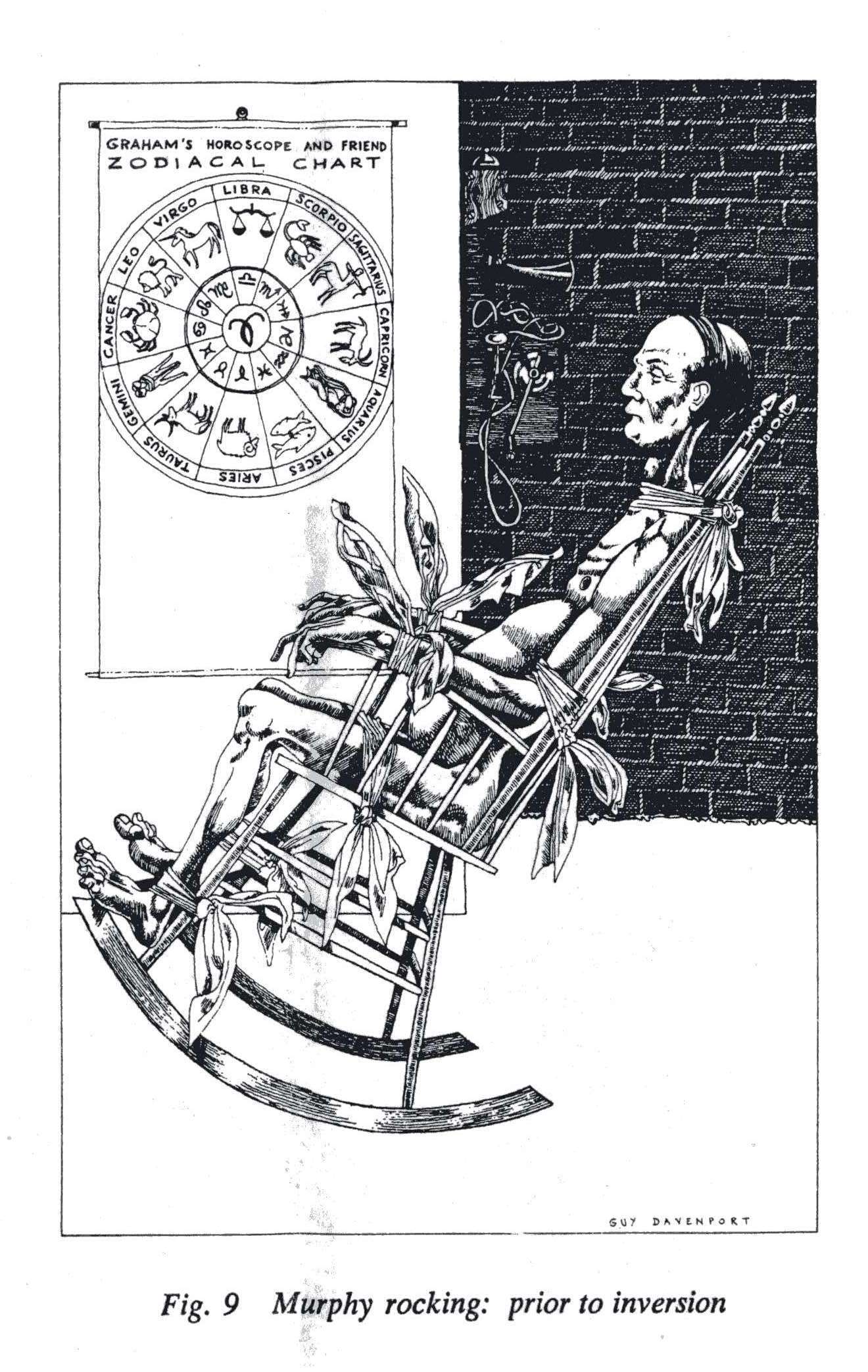Light in August is Faulkner’s longest book and certainly the most plainspoken of the early works, even more so than As I Lay Dying. I don’t think of Faulkner’s stream-of-consciousness techniques as being integral to his work in the way that experimental prose stylings are to Joyce or even Woolf, for they are always in the service of a a story–perhaps scrambled–that takes its expression in various ways. I see and feel less purely linguistic focus, and contrariwise, overwhelmingly strong thematic content that subordinates style and plot to its boundaries. That is to say, Faulkner is concertedly experimental in the same way that Melville is.
So because Light in August is about mostly sane and often simple people, it is very rare for any character save Joe Christmas to slip into Quentin Compson-ish mental chaos. Joe is rather crazy, and so his demons mix their words up:
thinking I dont even know that what they are saying to her is something that men do not say to a passing child believing I do not know yet that in the instant of sleep the eyelid closing prisons within the eye’s self her face demure, pensive; tragic, sad, and young; waiting, colored with all the vague and formless magic of young desire. That already there is something for love to feed upon: that sleeping I know now why I struck refraining that negro girl three years ago and that she must know it too and be proud, with waiting and pride
And for all this talk of Joe as Christ, it’s not particularly convincing. He continually runs away from himself and others. When he meets Joanna, who was brought up by abolitionists to feel damned by being white, he runs from her attempts to draw him into her own play of guilt and fatalism, but he fails and in turn rapes, lives with, and finally kills her.
Reading this again, I made a connection that I had never made before to Coetzee’s Disgrace. I often disagree with James Wood, but I think he was right in criticizing the novel for its historically overdetermined allegory:
Lucy’s “disgrace,” of course, is not one that she earned or deserved; but in pairing the two forms of penitence, the novel comes unpleasantly close to suggesting a formal parallel of disgrace, in which both characters enact “necessary” falls.
This is a significant weakness, and it returns us to Coetzee’s limitations, which are the limitations of allegory. Disgrace is so firmly plotted and shaped, so clearly blocked out, that it seems to request a kind of clarity of reading which is ultimately simplifying and harmful to the novel, in which “issues” are shared out between the generations, and split into willing binarisms: young and old, liberal and conservative, man and woman, straight and gay. Around this, the novel’s architecture attempts to fuse these binarisms, by arguing for a kind of parallelism. It as if the form of the book tells us that despite the oppositions of Lucy and her father, both characters share more than they divide, for here are two people undergoing their different-but-similar forms of disgrace.
And Lucy seems awfully close to Faulkner’s Joanna; she too takes the brunt of punishment directed at her historically and not personally, and Lucy too goes further in raising the child from her own rape.
Where I think Faulkner is stronger and does not fall into Coetzee’s hole is that he negates this inevitability, not with Lena’s child at the end, but with Joe himself, who is not black nor white, but takes on various identities over the course of the book at others’ insistence, only to be crushed by them over and over. The conclusive indication of this blank slateness is towards the end, before Joe is caught and lynched:
It is just dawn, daylight: that gray and lonely suspension filled with the peaceful and tentative waking of birds. The air, inbreathed, is like spring water. He breathes deep and slow, feeling with each breath himself diffuse in the neutral grayness, becoming one with loneliness and quiet that has never known fury or despair. ‘That was all I wanted,’ he thinks, in a quiet and slow amazement. ‘That was all, for thirty years. That didn’t seem to be a whole lot to ask in thirty years.’
Note: (1) the emphasis on “neutral grayness” and its non-racial implications; (2) organized thoughts presented as words rather than as italicized stream of consciousness; (3) the continuous emphasis of calm and peace, of nature in the absence of society; (4) the absence of any inner conflicting force. Joe’s demons are externally given by dint of situation, and in the brief moment that he feels left alone by all people and society, he gains peace. This is not to say that it is Joanna herself that assigns him his identity, but that Joanna is sewn in a determinate way into the social fabric in the way that Joe is not. People argue over whether Joe has “Negro blood” in him or not, but the whole point is that it doesn’t matter. Joe is put into situations where he purportedly does and doesn’t have it and it’s always for the worse. And the investigation of Joe’s situation and its indeterminacy (if I were being trendy, I would call it an aporia) is where Faulkner transcends Coetzee’s novel.
[I would say the same for Ralph Ellison, who extends this uncertainty into far greater territory in Invisible Man.]
